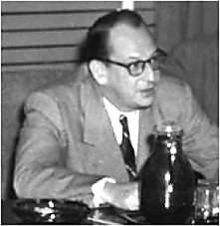Gordon Dean (lawyer)
| Gordon Dean | |
|---|---|
 |
|
| Born |
Gordon Evans Dean December 28, 1905 Seattle, Washington |
| Died | August 15, 1958 (aged 52) Plane crash at Nantucket Airport in Nantucket, Massachusetts |
| Nationality | American |
| Occupation | Lawyer, prosecutor |
| Known for | Chairman of the Atomic Energy Commission 1950=53 |
Gordon Evans Dean (December 28, 1905 – August 15, 1958) was a Seattle-born American lawyer and prosecutor who served as chairman of the US Atomic Energy Commission (AEC) from 1950 to 1953.
Dean received his J.D. from the University of Southern California in 1930 and an LL.M. from Duke University Law School in 1932. In 1934, Dean joined the U.S. Department of Justice during the New Deal administration of President Franklin Delano Roosevelt. Dean served under Attorneys General Homer S. Cummings and Frank Murphy as a Criminal Division attorney and press spokesperson. He had taught at Duke Law before being hired as assistant to Brien McMahon in the Criminal Division. Dean helped draft expansions of the federal criminal law and defended them in cases argued before the United States Supreme Court. In 1940, Attorney General Robert H. Jackson made Dean the press spokesperson for the Department of Justice. After six years at Justice, Dean left to join McMahon's law firm as partner.
After World War II military service, Dean served as press spokesperson for now Supreme Court Justice Robert H. Jackson who was the chief prosecutor in the Nuremberg Trials. Prior to his work with the AEC, Dean was professor of criminal law at the University of Southern California (1946–1949).
Dean was appointed by President Harry S. Truman as one of the original Commissioners of the AEC in May 1949, by which time McMahon had become Senator (in 1944), author of the Atomic Energy Act of 1946, and chair of the Joint Atomic Energy Committee of Congress. Dean was then appointed as the second Chairman of the AEC beginning in May 1950, following David Lilienthal, again with McMahon's backing. As early as 1950, Dean advocated for the appointment of a Presidential Science Advisor and science advisory task force. Dean served at the time of the Lawrence Livermore National Laboratory's creation in 1952. During Dean's tenure as Chairman, McCarthyism reached its peak. Robert Oppenheimer came under attack by Lewis Strauss, Edward Teller and others for his alleged foot-dragging at Los Alamos. Dean defended Oppenheimer. As Cold War tensions heightened and the Korean War raged on, Dean led a massive industrialization of the United States nuclear facilities. The hydrogen bomb, a nuclear weapon of massive and unprecedented force, was perfected during his tenure as Chairman with the detonation of the Ivy Mike hydrogen bomb, based on Edward Teller's design in October 1952. Dean served for a brief period under President Eisenhower as well, staying until the completion of his term on June 30, 1953.
...
Wikipedia
